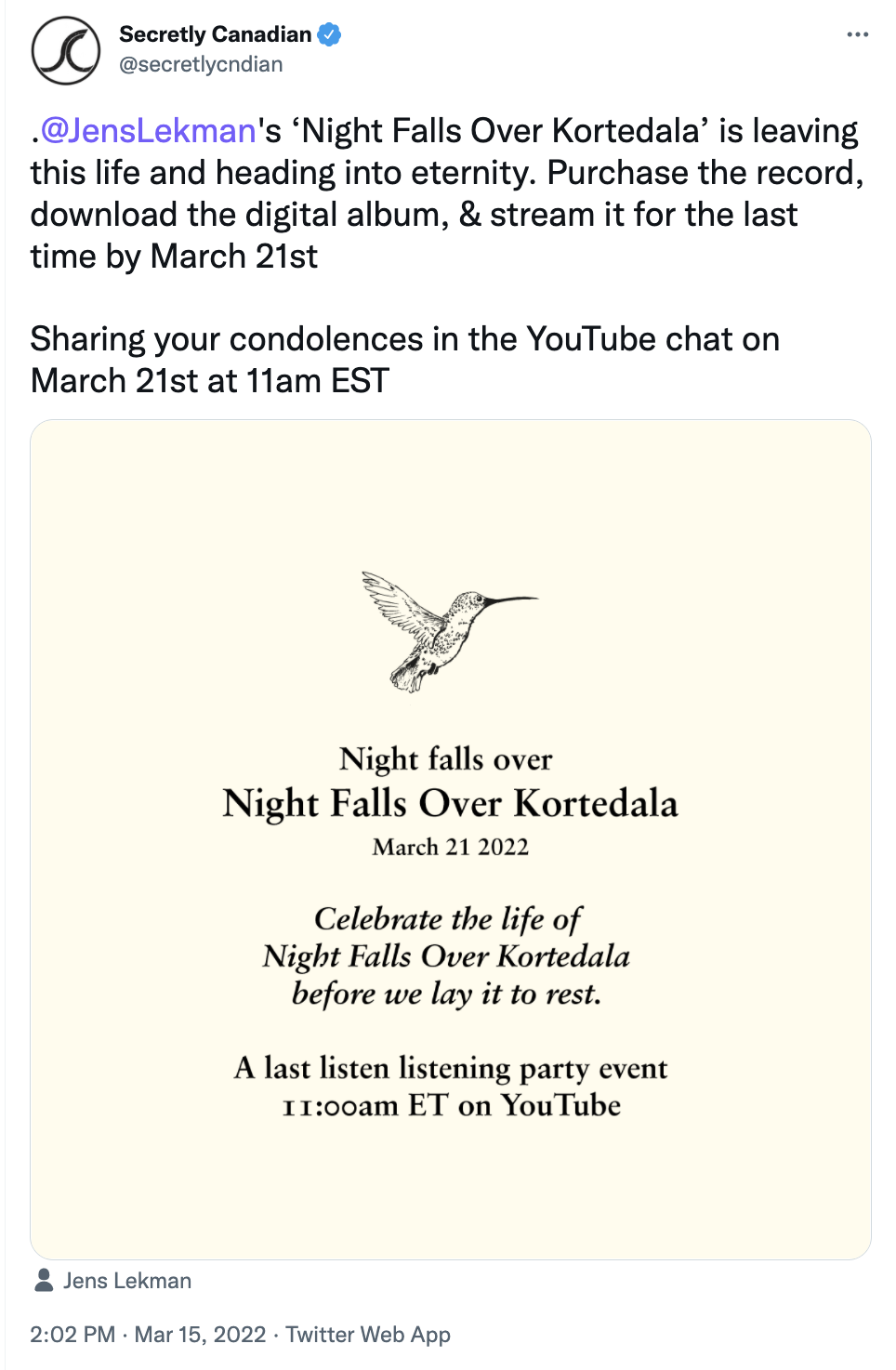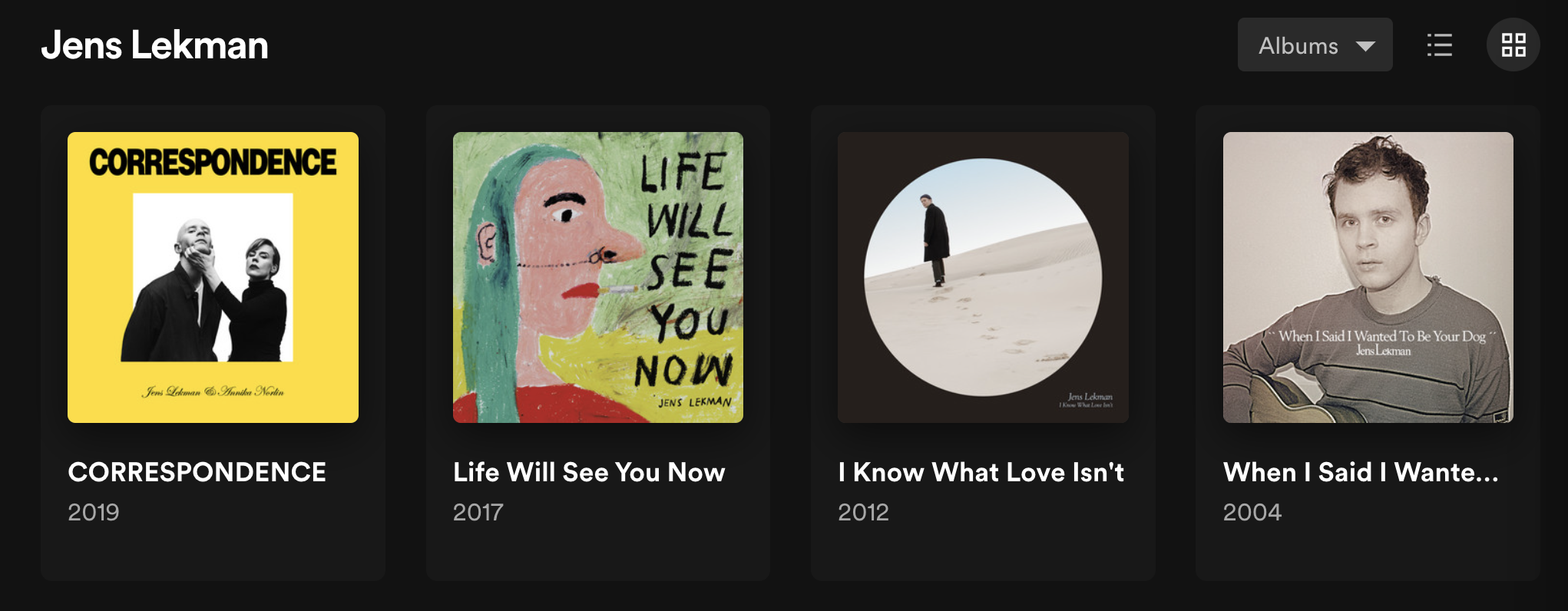![]()
Secretly Canadian
Saying Goodbye (kind of) to Night Falls Over Kortedala
REFLeCTING ON THE “RETIREMENT” OF JENS LEKMAN’S 2007 ALBUM
By lily Crandall
4.13.2022
Last month, record label Secretly Canadian announced that it is “retiring” Swedish singer-songwriter Jens Lekman’s 2007 indie pop album Night Falls Over Kortedala. It’s a lovely, sometimes grand, sometimes intimate, and always sweet album that the most important music opinions in the biz met with open arms upon its release, and it maintains a faithful following today. Lekman’s got a crooning, light sort of voice, reminiscent of Jonathan Richman & The Modern Lovers. It’s generally inoffensive, playful, baroque indie pop.
I like the album. “A Postcard to Nina,” a sweet, bumbling song, has a home on a few of my playlists. I don’t often specifically choose to play it, but it brings a smile to my face when it comes on shuffle. So why is it that the announcement of the album leaving streaming into “the ether” rattled me so much? I haven’t listened to it in months; I don’t know if I ever actually listened to it in full. Secretly Canadian announced its departure in a tweet, which sent me into a bit of a spiral.

I’m often inclined in my weirdly frequent conversations (and rants on my Close Friends story) about the state of music streaming to compare music and video streaming and to use Netflix and Hulu in analogies about Spotify and Apple Music. But they’re wildly different. By this point, we’re used to the ephemeral nature of additions to and subtractions from video streaming platforms. It seems constant that a favorite comfort show moves to HBO Max, that a platform boasts being the only one to have [insert widely-loved series here]. That’s not the case with music streaming platforms, for the most part (namely referring to the big guys here, Spotify and Apple Music). I’m used to being able to search for anything I have ever wanted to hear and listen to it instantly. I understand that that’s a product of my age, that it hasn’t always been like this. However, I am 23, and although I owned CDs and remember the days of trying to make a $10.00 iTunes gift card stretch as far as it could, the entire time I’ve been “into music”—the years that I have developed and curated what I now call my personal taste—have only come to be because I have been able to discover so much music without really meaning to.
So maybe that’s it—it’s not that I am sad about this particular album “retiring” from streaming and purchase options—it’s more that I lose the option, forever, to listen on a whim. No longer will it pop up in a playlist, artist radio station, or the autoplay that comes on after an album or playlist is through. The spontaneity is gone, for better or worse.
But then maybe that’s a good thing. I’ve been trying to be more deliberate with what I listen to. I’ve been getting into record collecting. I like that I have to make the decision to listen to something purposefully, as a certain amount of “work” goes into the whole ordeal.
Night Falls Over Kortedala’s “retirement” is a jarring reminder that streaming users are at the whim of political statements, lawsuits over samples, and in some cases, the romantic, symbolic act of laying a piece of art to rest when its creator deems it time. However, I’d be remiss if I didn’t mention the rumors of copyright issues relating to samples on the album being the reason that Lekman is pulling the album. After all, a previous release of his, Oh You’re So Silent Jens was taken down for that reason in 2011. When asked about it on his forum smalltalk, this was his response:
I have a complicated relationship to the past. Everyone who writes and has had some form of success does. When my album Oh You're So Silent Jens was taken down ten years ago due to sample issues, I almost felt a relief. The past had become too heavy. It's hard to explain but it used to bother me when someone said they liked something I'd done in the past. It was like... Imagine you're 40, like me, and someone said "I saw a photo of you when you were 21, you looked really good back then." That's a nice thing to say but it can also unintentionally translate to "you don't look that good anymore." And it feels the same way with a song, especially if you're still trying to write new songs. So the album was gone and I thought that would make me feel better but the effect was much more extreme than I thought. Because of streaming and the way we've been listening to music the last ten years it was like the album had never existed. For any new listener that album is not even a gap in the record collection. It has no absence, there's no void, unless you know exactly where it was supposed to have been. And over time these old songs have become like new songs.
Songs taken off Spotify live on in a weird in-between way for users who added the songs to their playlists before their removal. Grayed out and un-clickable, they live on as ghosts of playlists past, reminders of the ephemeral nature of music in digital form. They won’t come up if you search for them in the playlist; and for that reason I wasn’t able to find the final resting place of the grayed-out “A Postcard to Nina” on one of my 437 playlists. In the artist’s library there is no evidence something was ever there in the first place. The new, casual Jens Lekman fan doesn’t know there was something created and beloved between 2004 and 2012.

So maybe the album’s removal is due to sample issues, or maybe it’s motivated by the desire to lay the what was once meaningful in the past to rest, or some combination of both. Whatever the reason for its departure, I’ll miss this sweet album popping up in playlist recommendations and platform-curated mixes. I should tell myself to stop being so dramatic—after all, I’m lamenting the “retirement” of an album that I never listened to that much, an album that I actually bought digitally immediately after the announcement and have the option to listen to whenever I choose to. Promotional stunt or copyright drama or some other reason, I’m going to choose to believe it’s something more romantic than that. I’ll leave you with Lekman’s own words:
Sometimes I’ve fantasized about including a clause in my will about having all traces of myself erased once I’m dead. Placing my songs in a detergent solution and leaving nothing but white sheets behind. But that’s nonsense, I know. Pure narcissism in disguise. What I leave to the world belongs to the world. I donate it to you like I donate my body to science. I will from now on carry a donor card in my wallet that says ‘After my death - any song I’ve ever written and anything I’ve ever posted on my blog - may be used for the benefit of others. Take this old flesh, learn something from it. Carve in it. Tear it to pieces. Delete it if you want or frame it in a museum. Read my growth rings like a tree, my musical calcifications. Laugh with me and laugh at me. I was a human. No more, no less.’
This is usually the part of an article where the author says where you can
listen to the album. But you can’t!

Jens Lekman

